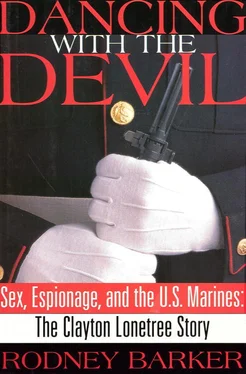Before this, the closest Yefimov had come to being involved in the recruitment of an American was when a woman from the American Embassy driving her car along the Rublonsky Highway ran over a Russian citizen, and instead of leaving waited for the traffic police to show up. It was an opportune time to initiate a recruitment effort, but when they ran a check and found she was a legitimate diplomat, they decided she would probably report on their efforts, and they decided not to bother. So this was going to be his maiden effort, and to prepare him, counterintelligence specialists came over and reviewed the character of the target and the details of the situation with him, and discussed the strategy and tactics of this kind of operation. He was briefed on the “Uncle Sasha” charade. He was counseled that his interest in Lonetree should appear to be motivated by friendship and goodwill. He was reminded to appeal to Lonetree’s vanity, and let him know he was not alone, others had done what he was doing.
Finally, he was told that even though Lonetree’s awareness of his compromising activities with Violetta, together with his interest in continuing his relationship with her, should assure his compliance, it would be a good idea to develop with him an ideological justification for what he was doing before actually tasking him with questions and assignments. “The string to his soul,” Yefimov was told, would be to connect his minority status as an Indian and the plight of his people at the hands of racist, capitalist America with the Soviet Union’s ideological struggle against imperialism and desire for a society based on justice and equality.
It was a lot to keep in mind, and at this stage of the operation Yefimov’s feelings were complicated by ambivalence. Half of him was excited by the challenge of recruiting a foreign agent, and having only read about recruitments accomplished “with the help of a skirt,” he was curious to find out for himself how influential women could be. At the same time he was unsure that the outcome would be worth the effort. It had been his understanding that counterintelligence tended not to bother with the recruitment of military people, because even though they were more vulnerable, they had more structure and oversight than civilians and were required to account for their time almost up to the minute. That made it more difficult to maintain ongoing relations with them.
He was nervous too because it was a case with political ramifications. Bosses with high ambitions and great expectations would be looking over his shoulder and assessing his every move. If for some reason the operation went bad, if the Marine did not produce what the bosses expected, Yefimov knew that he could be held personally accountable—which was also the Soviet way.
Yefimov’s first impressions of Lonetree were strictly professional. Purposely he did not allow himself to have any personal feelings. He had been fully briefed on the Marine’s background and was aware that he was dealing with “a very sad and unhappy man”; but his understanding of Lonetree did not go so far as to include compassion, because that would have been inappropriate, and he knew that he was recruiting Lonetree on the basis of his shortcomings.
It became rapidly clear to him that subterfuge was not a requirement. Lonetree appeared to immediately figure out who he was, and wasn’t, and since he knew very well who Lonetree was, the game of hide-and-seek was unnecessary. For this reason Yefimov also decided not to dwell for too long on the cliché of Indians in conflict with the white man. He knew his bosses were hoping for confirmation of the Leninist interpretation of American society that maintained disaffected minorities were anxious to overthrow the yokes of their capitalist oppressors, and in the reports he filed he told them what they wanted to hear. But these were exaggerations. To stress this theme, he felt, would confuse Lonetree and had the potential to jeopardize the case. The key to Lonetree’s cooperation, he realized, was not his grudge against Western society but his obsession with Violetta.
In his meetings with counterintelligence Yefimov had been instructed to ask questions that would enable them to identify American intelligence officers working behind the facade of the embassy under the guise of diplomats. CI generally had a pretty good idea who the CIA agents were, but there were always a few people they had difficulty identifying, and Lonetree was in a position to help them confirm their suspicions.
Then there were the other areas CI wanted him to cover, such as updating and detailing renovated spaces inside the embassy; information about the security systems (where they were located and how they functioned); and data on embassy personnel (the location of their work spaces, the hours they kept, their personal habits and characteristics) that would expand the KGB’s recruitment dossiers.
Ideally an agent inside an embassy could also do things like procure secret documents, but in this regard Yefimov had been instructed it would be a mistake to task the Marine beyond his means. Each employee in the embassy had his own circle of issues he dealt with, and if Lonetree suddenly started asking questions about matters that were none of his business, or attempted to acquire documents not normally available to him, it could raise suspicions that would give him away.
Something a Marine guard could do, however, particularly when patrolling the embassy by himself at night, was install listening devices, and Yefimov did hope that he would be able to get Lonetree to follow the example of the guard recruited at the British Embassy years ago. After describing an important meeting room in the embassy, he was asked to bring a lightbulb from the chandelier to his handler. KGB technicians reconstructed it, planting a microphone inside, and the bulb was returned to the guard, who replaced it. The ruse worked perfectly. Not until the British began to realize that information was somehow being leaked, and the walls and ceiling and floor were torn apart, was the bug in the lightbulb discovered. But when Yefimov asked Lonetree if he would be willing to do something similar, he balked at the suggestion, and rather than pressure him, Yefimov had backed off.
It would be up to others to analyze and decide on the ultimate worth of the information supplied by Lonetree, but from what Yefimov could tell, a greater satisfaction was derived from the fact that the security services had an American agent in their control than from any particular piece of information Lonetree delivered. This was true on the lower levels of the KGB, where at this stage of the Cold War there had been so many defections to the West that the recruitment of an American was perceived as giving “the finger” to the CIA, as well as among KGB higher-ups, who regarded Lonetree as a major ideological coup. KGB Chairman Chebrikov was receiving daily reports on the progress of the operation, and would brag at various intelligence and political functions how “under the toughest working conditions,” a security guard at the American Embassy was doing KGB work.
Much to Yefimov’s dismay, certain members of the Central Committee of the Communist Party of the Soviet Union (CPSU) were also aware of the case, and had decided to become involved. This was a time of economic and military uncertainty within the Central Committee, and a growing number of people were concerned about the future of Communism and looking for confirmation that the Western democracies were in an even greater state of decay. What better proof could there be, some of these apparatchiks decided, than for a Marine, an esteemed member of the enemy’s military elite, to become a Russian agent? And so they made requests that came to Yefimov in the form of orders to ask Lonetree questions about matters that no Marine guard would have knowledge of, or that were beyond his intellectual ability to answer.
Читать дальше












